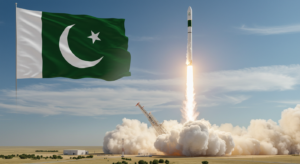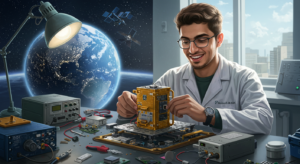
Pakistan Joins Chinese Space Station Mission 2026: A Golden Opportunity for Researchers
Pakistan is stepping into the future of science and space technology by collaborating with the China Manned Space Agency (CMSA) for its 2026 Chinese Space Station (CSS) mission. This initiative, announced on the official SEAD portal (sead.pk), is not only an extraordinary chance for Pakistani students, researchers, and scientists to contribute to space research but also a giant leap for the country in terms of technological and scientific progress. The Government of Pakistan, through the Ministry of Planning, Development and Special Initiatives, has launched this program to enhance indigenous research capacity and align with Sustainable Development Goals (SDGs).
This mission invites participants from all over Pakistan to design scientific experiments that can be performed in microgravity aboard the CSS. The Chinese space program is well-established and known for its advanced space science infrastructure. Through this collaboration, Pakistanis now have a gateway to test their experiments in space, study results, and publish findings internationally. This opportunity is an excellent way to gain recognition in the global scientific community.

Why This Opportunity Is Important
Conducting experiments in space offers a unique perspective and results that cannot be achieved on Earth. The microgravity environment of space helps scientists understand processes in biology, physics, material science, and medicine from a completely new angle. This initiative aims to foster innovation and open doors for long-term partnerships between Pakistan and global space leaders like China.
Fields You Can Work In
Applicants can submit proposals in areas including but not limited to:
- Biotechnology and space medicine
- Physics and fluid dynamics in microgravity
- Radiation shielding and space environment study
- Material science and crystal growth in space
- Energy harvesting in space (e.g., solar panel efficiency)
- Artificial intelligence for onboard systems
Eligibility Criteria
This program is open to Pakistani citizens with a background in science or engineering. Individuals from the following backgrounds are encouraged to apply:
- Undergraduate and postgraduate students
- University researchers and PhD scholars
- Startups with R&D capabilities
- Public or private research institutions
How to Apply: Step-by-Step
- Develop your idea: Think of a simple yet innovative experiment that can benefit from microgravity. It must be executable in one week by an astronaut and must have scientific or commercial relevance.
- Prepare a proposal document: Your proposal should include the title of the experiment, scientific objective, hypothesis, methodology, expected outcome, and potential impact.
- Write a motivational letter: Explain why you are interested in this opportunity and what impact your work could have if selected.
- Include a recommendation letter: Get a signed letter from your academic supervisor or teacher who knows your potential.
- Attach your personal profile/CV: Highlight your academic and research achievements, particularly those related to space, physics, or engineering.
- Send your application: Email all the above documents in PDF format to sead@planning.gov.pk before April 30, 2025.
What Happens After Submission?
Once you submit your documents, they will be evaluated by a panel of experts. If your proposal is shortlisted, you will be contacted for further instructions and technical support. You do not need to have a complete prototype or payload before submitting your idea, but it should be well thought out and feasible. After acceptance, teams will receive guidance and collaboration opportunities to refine and prepare the payload for the 2026 launch.
Final Thoughts
This opportunity is a national-level call for scientific excellence. It promotes local innovation and puts Pakistan on the map for space-based research. If you’re a student, researcher, or tech enthusiast with a dream to explore space — this is your chance to reach beyond the sky. Visit the official announcement page for more details: SEAD Space Program Official Announcement.
Written by Ahmad Saeed for Global Lens — Shedding light on science, innovation, and the universe beyond.

